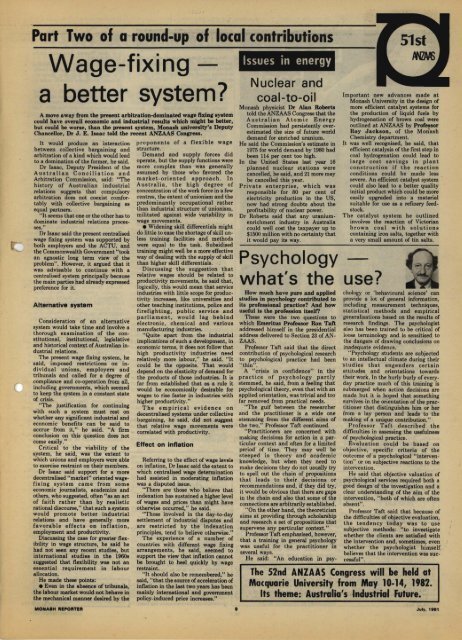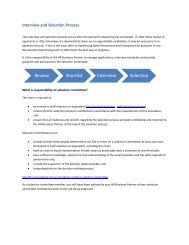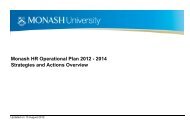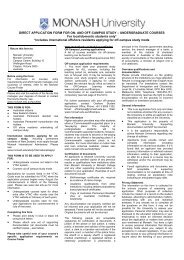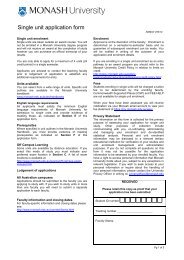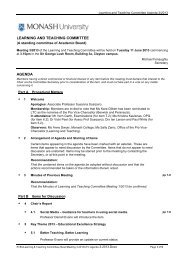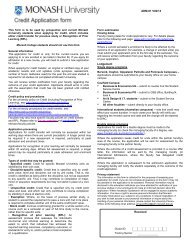No.5-81 July - Adm.monash.edu - Monash University
No.5-81 July - Adm.monash.edu - Monash University
No.5-81 July - Adm.monash.edu - Monash University
- No tags were found...
Create successful ePaper yourself
Turn your PDF publications into a flip-book with our unique Google optimized e-Paper software.
Part Two of a round-up of local contributions Wage-fixinga better system?A move away from the present arbitratlon-dominated wage fixing oystemcould have overan economic and industrial "",ults which might be better,but could be worse, than the present sYltem, Monalh university's DeputyChancellor, Dr J. E. Isaac told the recent ANZAAS Congress.It would produce an interaction propo nents of a flexible wagebetween collective bargaining and structure.arbitration of a kind which would lead Demand and supply forces didto a domination of the former, he said. operate, but the supply functions wereDr Isaac, Deputy President of the more complex than was generallyAustralian Conciliation and assumed by those who favored theArbitration Commission, said: ''The market-oriented approach. Inhistory of Australian industrial Australia, the high degree ofrelations suggests that compulsory concentration of the work force in a fewarbitration does not coexist comfor centres, the extent of unionism and thetably with collective bargaining as predominantly occupational ratherequal partners.than industrial structure of unionism,"It seems that one or the other has to militated against wide variability indominate industria} relations proces wage movements.ses. "• Widening skill differentials mightDr Isaac said the present centralised do little to ease the shortsge of skill unwagefixing system was supported by less training facilities and methodsboth employers and the ACTU, and were equal to the task. Subsidisedthe Commonwealth Government "took training might well be a more effectivean agnostic long term view of the way of dealing with the supply of skillproblem". However, it argued that it than higher skill differentials.was advisable to continue with 8 Discussing the suggestion thatcentralised system principally because relative wages should be related tothe main parties had already expressed productivity movements, he said that,preference for it.logically, this would mean that serviceindustries with little scope for productivityincreases, like universities andAlternativ. systemother teaching institutions, police andfirefighting, public service andparliament, would lag behindConsideration of an alternative electronic, chemical and varioussystem would take time and involve a manufacturing industries.thorough examination of the con "Quite apart from the industrialstitutional, institutional, legislative implications of such a development. inand historical context of Australian in economic terms, it does not follow thatdustrial relations.high productivity industries needThe present wage fIXing system, he relatively more labour~ " he said. "Itsaid. imposed restrictions on in could be the opposite. That woulddividual unions, employers and depend on the elasticity of demand fortribunals and called for a degree of the products of those industries. It iscompliance and co-operation from all, far from established that as a rule itincluding governments, which seemed would be economically desirable forto keep the system in a constant state wages to rise faster in industries withof crisis.higher productivity."HThe justification for continuingThe empirical evidence onwith such a system must rest on decentralised systems under collectivewhether any significant industrial and bargaining, he said, did not suggesteconomic benefits can be said to that relative wage movements wereaccrue from it,II he said. "A firmcorrelated with productivity.conclusion on this question does notcome easily. IIEffect on InflationCritical to the viability of thesystem, he said, was the extent towhich unions and employers were able Referring to the effect of wage levelsto exercise restraint on their members. on inflation, Dr Isaac said the extent toDr Isaac said support for a more which centralised wage detenninationdecentralised Hmarket" oriented wage had assisted in moderating inflationfixing system came from some was a disputed issue.economic journalists, academics and "There are those who believe thatothers, who suggested, often "as an act indexation has sustained a higher levelof faith rather than by realistic of wages and prices than might haverational discourse, II that such a system otherwise occurred," he said.would promote better industrial "Those involved in the day-to-dayrelations and have generally more settlement of industrial disputes andfavorable effects on inflation, are restricted by the indexationemployment and productivity. principles, tend to believe otherwise."Discussing the case for greater flex The experience of a number ofibility in wage structure, he said he countries with different wage fainghad not seen any recent studies, but arrangements, he said, seemed tointernational studies in the 19800 support the view that inflation cannotsuggested that flexibility was not an be brought to heel quickly by wageessential requirement in labour restraint.allocation."It should also be remembered," heHe made these points:said, "that the BOurce of acceleration of• Even in the absence of tribunals, inflation in the last two years has beenthe labour market would not behave in mainly international and governmentthe mecbanical manner desired by the policy-induced price increases,"MONAeH RlPOlITI1IIssues in energyNuclear andcoal-to-oil<strong>Monash</strong> physicist Dr Alan Robertstold the ANZAAS Congress that theAustralian Atomic EnergyCommission had .persistently overestimatedthe size of future worlddemand for enriched uranium.He said the Commission's estimate in1975 for world demand by 1980 hadbeen 114 per cent too high.In the United States last year 16planned nuclear stations werecancelled, he said, and 21 more maybe cancelled this year.Private enterprise, which wasresponsible for 80 per cent ofelectricity production in the US,now had strong doubts about theprofitsbility of nuclear power.Dr Roberts said that any uraniumenrichmentindustry in Australiacould well cost the taxpayer up to$1500 million with no certsinty thatit would pay its way.Psychology what's the use?How much have pure and appliedstudies in psycholollY contributed toits professional practice? And howuseful il the proCession itself?These were the two questions towhich Emeritus Profesaor Ron Taftaddressed himself in the presidentialaddress delivered to Section 23 of ANZAAS.Professor Taft said that the directcontribution of psychological researchto psychological practice had been" thin".A IIcrisis in confidence" in thepractice of psychology partlystemmed, he said, from a feeling thatpsychological theory, even that with anapplied orientation, was trivial and toofar removed from practical needs.liThe gulf between the researcherand the practitioner is 8 wide onestemming from the different aims ofthe two," Professor Taft continued."Practitioners are concerned withmaking decisions for action in a particularcontext and often for a limitedperiod of time. They may well besteeped in theory and academicknowledge, but when they need tomake decisions they do not usually tryto spell out the chain of propositionsthat leads to their decisions orrecommendations and, if they did try,it would be obvious that there are gapsin the chain and also that some of theconnections are arbitrarily established."On the other hand, the theoreticianaims at providing through scholarshipand research a set of propositions thatsupervene any particular context."Professor Taft emphasised, however,that a training in general psychologywas useful for the practitioner inseveral ways.He said: "An <strong>edu</strong>cation in psy-Important new advances made at<strong>Monash</strong> <strong>University</strong> in the design ofmore efficient catalyst systems forthe production of liquid fuels byhydrogenation of brown coal wereoutlined at ANZAAS by ProfessorRoy Jackson, of the <strong>Monash</strong>Chemistry department.It was well recognised, he said, thatefficient catalysis of the first step incoal hydrogenation could lead tolarge cost savings in plantconstruction if the reactionconditions could be made lesssevere. An efficient catalyst systemcould also lead to a better qualityinitial product which could be moreeasily upgraded into a materialsuitable for use a8 a refinery feedstock.The catalyst system he outlinedinvolves the reaction of Victorianbrown coal with solutionscontaining iron salts, together witha very small amount of tin salts.chology or 'behavioural science' canprovide a lot of general information.including measurement techniques,statistical methods and empiricalgeneralisations based on the results ofresearch findings. The psychologistalso has been trained w be critical ofloose terminology and is sensitised tothe dangers of drawing conclusions oninadeQuate evidence." Psychology students are subjectedto an intellectual climate during their-s tudies that engenders certainattitudes and orientations towardstheir work. In the hurly burly of everydaypractice much of this training issubmerged when action decisions aremade but it is hoped that somethingsurvives in the orientation of the practitionerthat distinguishes him or herfrom a lay person and leads to themaking of a unique contribution."Professor Taft described thedifficulties in assessing the usefulnessof psychological practice.Evaluation could be based onobjective, specific criteria of theoutcome of a psychological "intervention"or on subjective reactions to theintervention.He said that objective valuation ofpsychological services required both agood design of the investigation and aclear understsnding of the aim of theintervention, "both of which are oftenabsent".Professor Taft said that because ofthe difficulties of objective evaluation,the tendency today was to usesubjective methods: "to investigatewhether the clients are satisfied withthe intervention and, sometimes, evenwhether the psychologist himself.believes that the intervention was successful".The S2nd ANZAAS Congress will be held at Macquarie <strong>University</strong> from May 10-14, 1982. Its theme: Australia's .Industrial Future. •JUty. 19<strong>81</strong>


